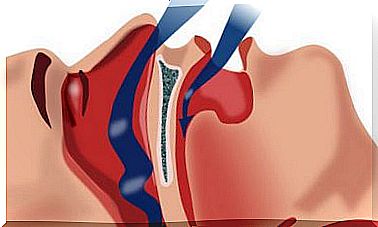Food Additive Allergy: Symptoms
Although data is still scarce, we know that there are a significant number of cases of food additive allergies. This allergy is not a simple intolerance. On the other hand, it causes immune reactions that can be life threatening.

Food additive allergies are a problem that often goes unnoticed because they are confused with food intolerances. In truth, they are very different phenomena even though they have a common origin and present similar symptoms.
In the case of food intolerance, the digestive system becomes irritated because the person has difficulty in correctly assimilating a food or a food additive.
When it comes to allergies to food additives and to food in general, the immune system reacts disproportionately and can put an individual’s life in danger.
In general, the population pays more attention to food intolerances or allergies than to food additive allergies. Indeed, these substances are present in most processed foods, but those who consume them are not aware of their harmful potential.
Food additives
Food additives are substances that are added to processed foods during their preparation. They make it possible to modify the food, its flavor, its texture, its color, its aroma or the storage time, among others. These substances are to be used with the approval of the health authorities and must appear on the packaging of the product.
Food additive allergy occurs when the body identifies one of these substances as potentially dangerous. This then generates an immune reaction to attack this additive, with symptoms that can become very serious.
Symptoms of food additive allergies

In addition, the symptoms of food additive allergy can be very varied. However, the most common are respiratory. For example, asthma and rhinitis. As well as those of a cutaneous nature such as urticaria and various forms of dermatitis.
In addition, the symptoms can progress to cause a more serious reaction called anaphylaxis, which is potentially fatal. This happens quickly and violently. It is due to the massive release of histamine and other substances. This causes narrowing of the airways, and possibly death.
Currently, it is estimated that 5-10% of chronic urticaria cases are due to an allergy to food additives. However, this estimate could be larger. So far, there are several limitations for the diagnosis of this allergy. In general, intolerance to certain foods can be a suspicious signal that should be investigated by an allergist.
Potential risk of certain additives
Any food additive can cause unwanted effects. But, some of them have a higher potential risk. Here are a few :
- Antioxidants: Urticaria and atopic dermatitis have been reported when eating meals with industrial antioxidants. In rare cases, they produce bronchospasm
- Sulfur dioxide and sulphites: Sulphites can cause respiratory symptoms such as rhinitis or worsening in people with asthma. These additives could also be the cause of contact dermatitis, urticaria or digestive problems.
- Nitrates and nitrites: they are associated with a worsening of atopic dermatitis as well as cases of severe allergic reactions
- Benzoic acid and benzoates: these are the additives most associated with allergic reactions. They cause atopic dermatitis and asthma, hives, headaches, migraines, difficulty concentrating as well as hyperactivity
- Methylcellulose: it is associated with adverse reactions at the gastrointestinal level
- Gelatin E441: this is a thickener that can cause serious allergic reactions
- Guar gum and tragacanth gum: the former can cause gastrointestinal problems. The second can make atopic dermatitis worse or cause hives
- Monosodium glutamate: this additive can cause serious allergic reactions
- Dyes: they can cause mild, moderate or, in rare cases, severe allergic reactions
Treatments for allergies to food additives

There is no effective treatment for allergy to food additives other than removing them from the diet. However, this can turn out to be somewhat difficult. Indeed, nowadays, a lot of foods contain these additives which have an allergic potential.
On the other hand, food additives are not always identified with their name, except by a reference number. It is therefore important to learn about the name of the components that correspond to this number or code. Therefore, the best way is to avoid precooked or prepared foods of industrial origin.
Finally, the less a food is industrially processed, the less additives it contains. The best diet is therefore that which recommends fresh foods, of natural origin. In addition, it is essential to avoid the consumption of foods with unclear nutritional information. In these cases, your best bet is to refrain from buying them.









